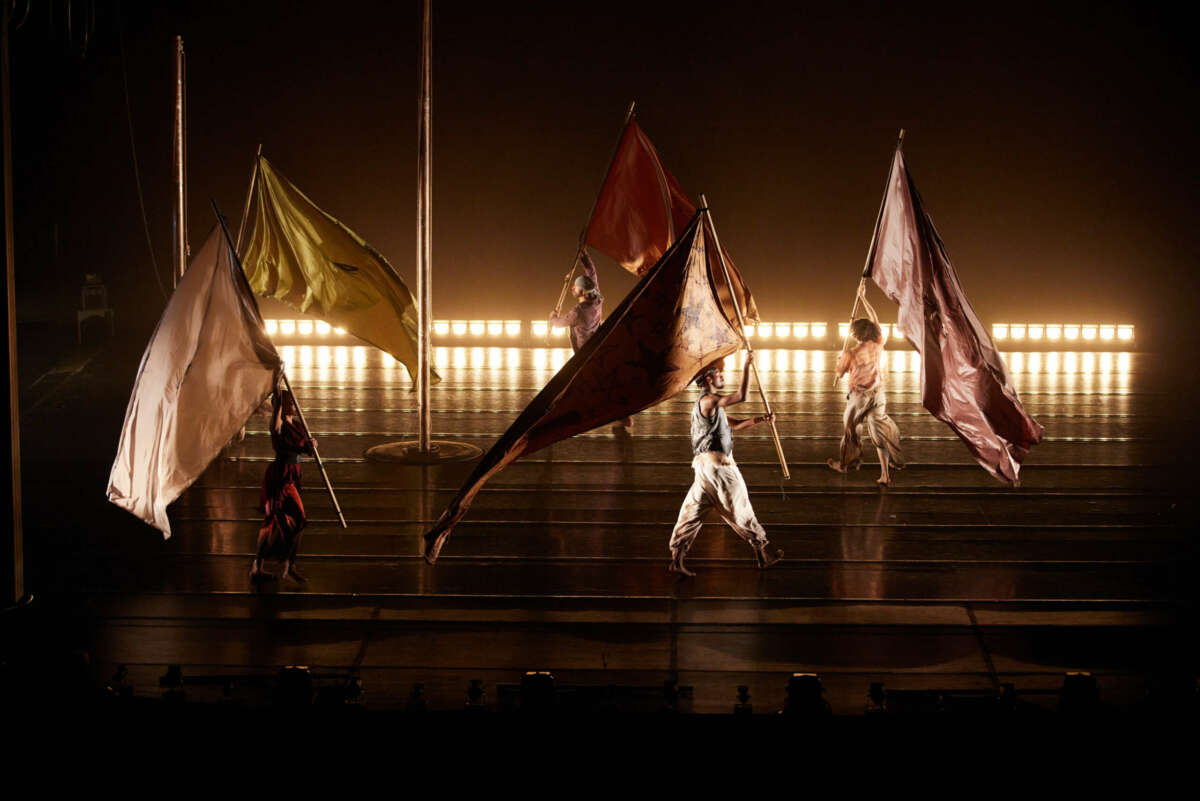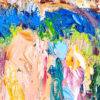One of the unique dance productions coming to Gotham in November 2022 that we’re most excited about is the New York premiere of a work by a Jerome Robbins Award-winning choreographer and director. Stefanie Batten Bland’s dance theater work Embarqued: Stories of Soil makes its New York debut November 1-5, 2022 at the BAM Next Wave Festival, and surprisingly the work has close ties to Martha’s Vineyard. We recently spoke with Company SBB’s Stefanie Batten Bland about the origin of this work, the process of bringing it to life after years of intense research, and its connection to the Martha’s Vineyard African American Heritage Trail.
BAM Next Wave Festival returns after 3-year hiatus
The BAM Next Wave Festival is back for the first time in three years, and the program is filled with compelling and provocative theater, music, and dance performances. With a mission of staging “emerging, iconic, and genre-defying” works, this annual cultural festival is the perfect place to see the new and the next as well as catching performances from beloved iconic artists.
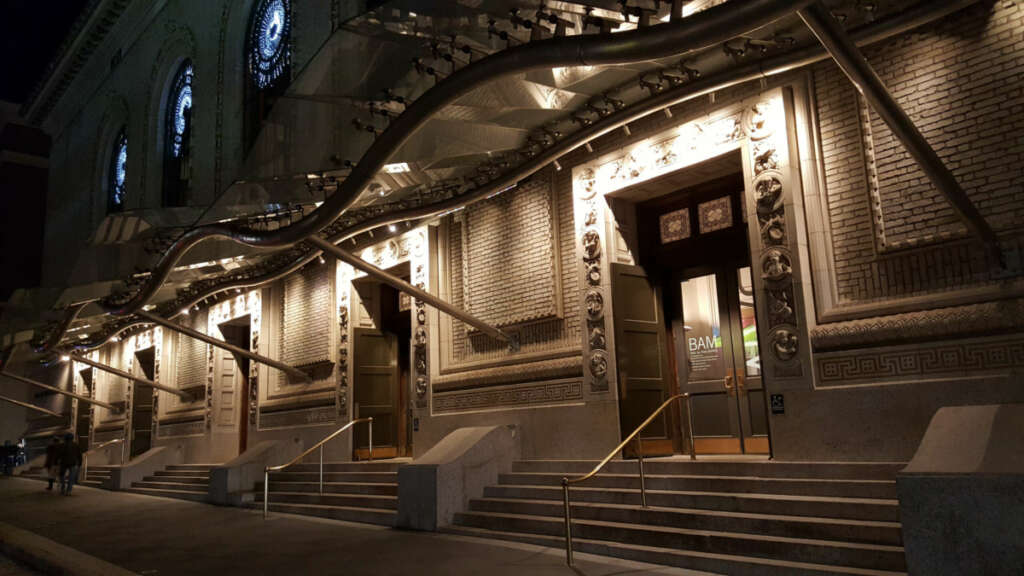
Embarqued: Stories of Soil makes its New York debut at BAM Next Wave Festival 2022. Photo Credit: Shutterstock.
who is Stefanie Batten Bland?
A second-generation creator and artist, Batten Bland grew up in SoHo in New York City. Her father was a jazz composer and performer and her mother was a writer, known for her children’s books as well as her works about science and scientific research.

Dance theater choreographer Stefanie Batten Bland. Photo Credit: Phil Provencio.
Batten Bland herself began her career as an artist as a performer, dancing with Bill T. Jones and Pia Bausch. She was head choreographer at the Paris Opéra Comique when she realized that she was finding joy in both performing and creating. She loved telling stories, and increasingly devoted her time to crafting different works that allowed her to “excavate territory.” And to shed light on the existential question “Why do we do the things we do to one another?”
In 2008 she formed Company SSB, and went on to create acclaimed work across dance, theater, film and music.
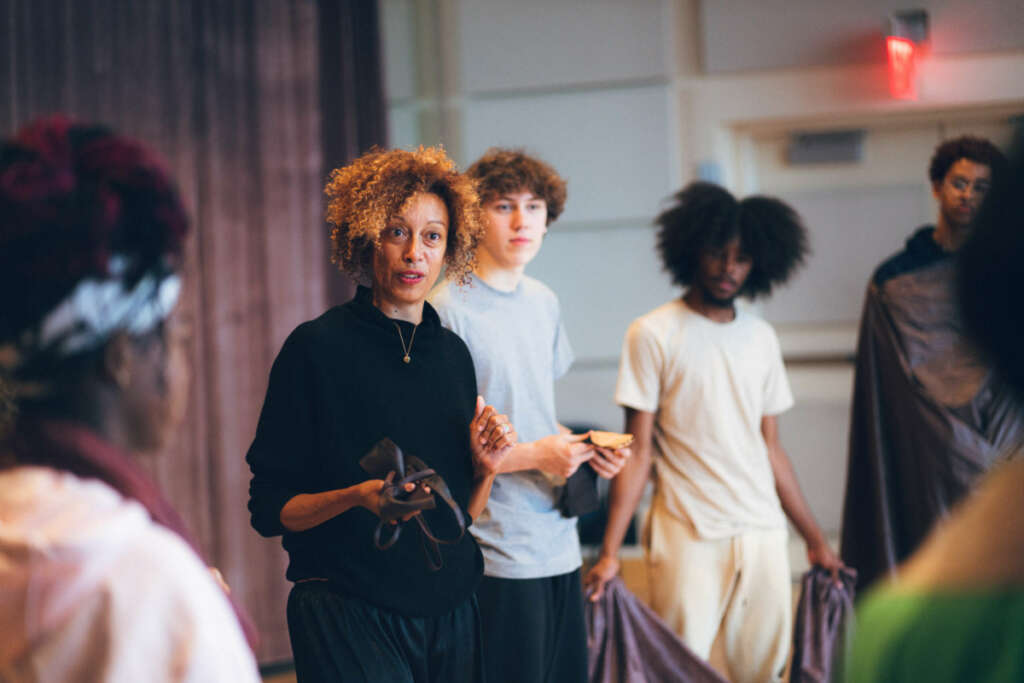
Dance theater choreographer Stefanie Batten Bland. Photo Credit: Phil Provencio.
Embarqued: Stories of Soil
In 2021, Batten Bland was awarded the National Dance Project Production Grant for her work Embarqued: Stories of Soil. It premiered at Duke Performances earlier this year.
We were delighted to learn that the origin story of Batten Bland’s dance theater piece includes a wonderful and surprising connection to one of our favorite places in the world: the island of Martha’s Vineyard. Long the summer vacation destination of choice for African-American families, Martha’s Vineyard has recently gained even more renown as the summer home of Former President Obama and his family. Our family has spent time there every August for decades and we were intrigued by the connection.
How can an idyllic summer vacation destination be the inspiration for a tale of slavery, colonialism and the struggle for freedom? We pulled up and chair and listened to the story of how it all came to be.
exploring the island of Martha’s Vineyard
Like many of us, Batten Bland fell in love with the island of Martha’s Vineyard on her first visit to the bucolic summer retreat. “Martha’s Vineyard changes people for so many reasons. It’s well-maintained, rooted in courtesy, privacy and decency. For every type of person. It validates for everyone that they have the right to exist.”
Of course, this admiration and affection for the island has not blinded her to its historical realities, and the inherent ironies and contradictions that result from them. “Martha’s Vineyard is a place that was the site of the horrors of slavery. But also a place where slaves sued for their freedom.”
the Black experience on Martha’s Vineyard
In 2016, Batten Bland read the book Lighting the Trail, about the Martha’s Vineyard African American Heritage Trail. The book led her to reflect on the complex history of the state of Massachusetts: a place where chattel slave-owners put down deep roots. Where the Wampanoag tribes were practically wiped out. And yet, a place that was among the very first abolitionist states in America.
“It all happened right here,” she notes – making the Vineyard the ideal setting for an exploration of themes related to America and the lived experience of all of its people.
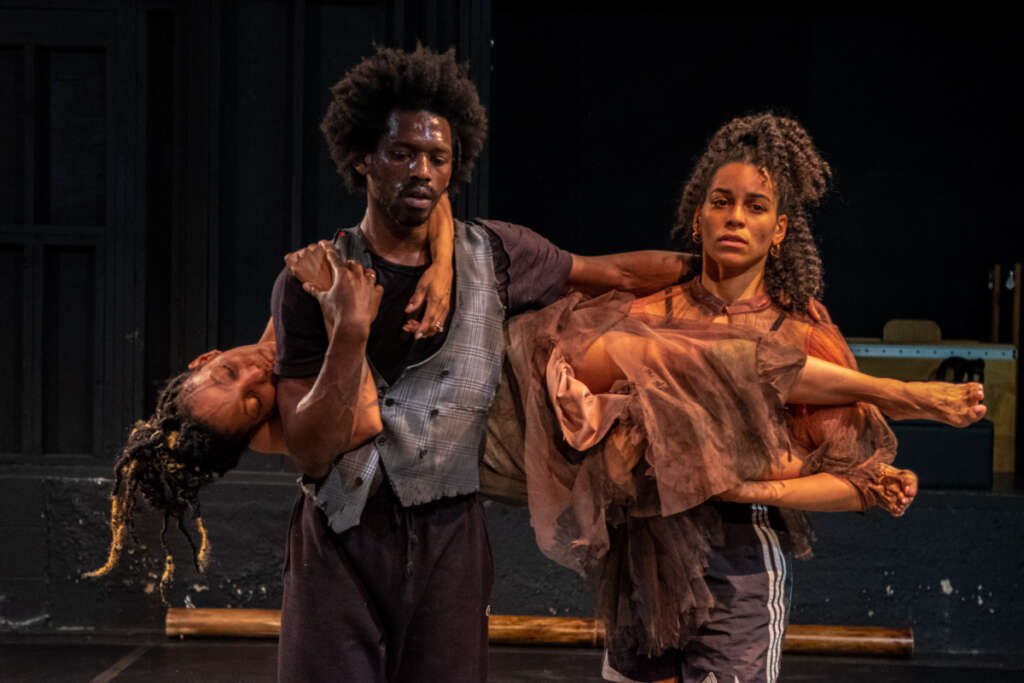
Stefanie Batten Bland’s dance Embarqued: Stories of Soil makes its New York debut in 2022 at BAM. Photo Credit: Alex Boerner.
She already knew of the rich history of Black Americans and their activities on the island of Martha’s Vineyard. For example, Martin Luther King, Jr. wrote Civil Rights speeches there. Former slave and orator Frederick Douglass delivered an iconic speech on July 4 at a church in Edgartown. It has long been the site of Black excellence.
And yet even in this paradise, there were echoes of racism and the legacy of slavery. For example, Batten Bland cites a familiar landmark on the island. “I reflected on the Inkwell Beach – who gets to name pieces of land? And how are those names interpreted over time and among different groups of people?” The Inkwell in Oak Bluffs is a beloved beach frequented primarily by Black islanders. It’s referred to by this name with pride now. But one wonders who first called it that. And why. And what they wanted to communicate with such a moniker.
the African American Heritage Trail
Following this thread, Batten Bland began to visit the 26 sites on the African American Heritage Trail. One of the elements that immediately struck her? Almost none of the stops on the Trail are the towering traditional monuments that represent the aesthetic of colonialism. Instead, they are human-scale. And in some cases, still in the process of being co-created by visitors in the current moment. “One of the monuments is actually a pile of rocks. And people who visit add to the pile. It’s a way for everyday people to participate in memorialization. And its empowering. There’s no need to look up and to feel dominated by the monument.”
After repeated visits to the various sites on the trail, she realized there was a rich story to tell about history, its ironies and the lessons to take from it. “That was when I decided that I needed to make a boat.”
the ship mast
“I went to the shipyard in Chilmark and found a sea captain willing to work with me. He later became the set designer for this work. We spent the next few years building the boat. At the same time I was talking with art historians and others to understand the history of embarkation and disembarkation on the island.”
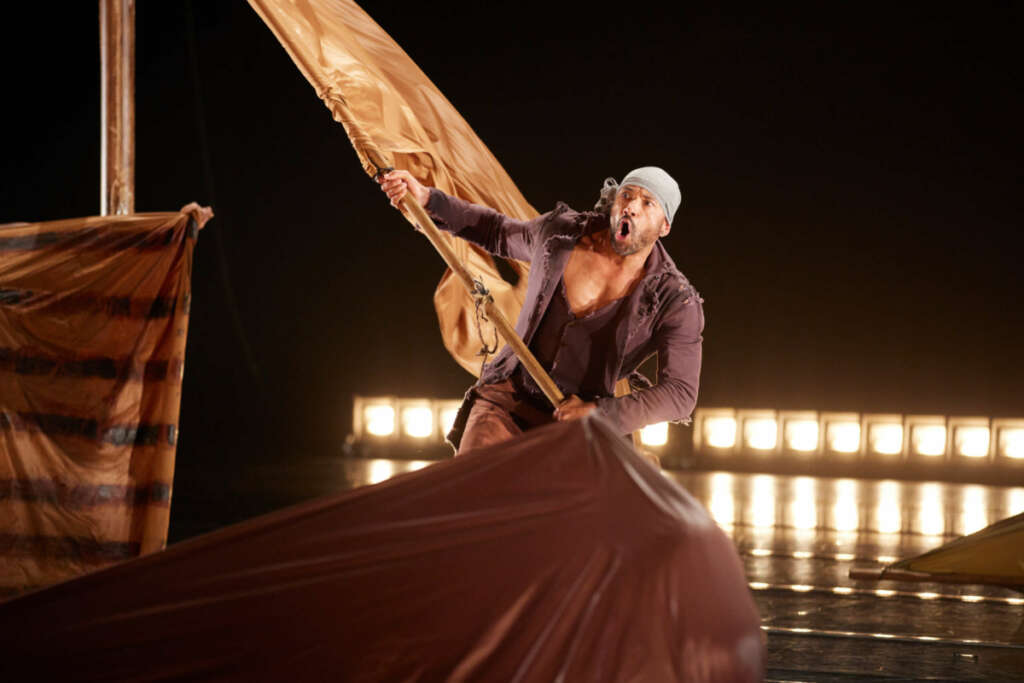
Stefanie Batten Bland’s dance theater work Embarqued: Stories of Soil makes its New York debut in 2022 at BAM; the piece has a close tie to Martha’s Vineyard. Photo Credit: Alex Boerner.
the dual meaning of the word “soil”
The title of the work – Embarqued – has layers of meaning. It is deliberately rendered in the past tense. It is spelled to reflect both the English and French elements of Batten Bland’s heritage.
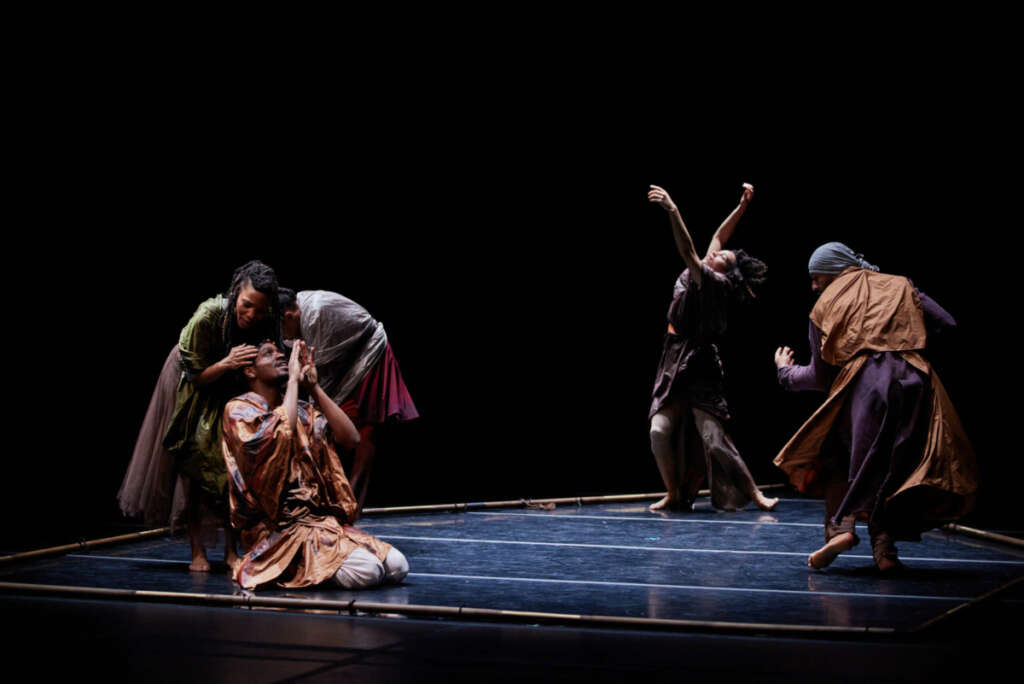
Stefanie Batten Bland’s dance theater work Embarqued: Stories of Soil. Photo Credit: Alex Boerner.
And while the ship’s mast speaks of water and the sea, this work is also focused on what happens on dry land. The idea of land – and claiming land – is central to many of the historical acts that inspired the creation of Embarqued. Thus, the subtitle Stories of Soil also has multi-layered meaning.
In the English language, the word “soil” can represent something highly positive – a feeling of rootedness and belonging, even when surrounded by strangers. But it is also symbolic of dirtiness and contamination – triggering the need to wipe it (or those who represent it) out entirely. These words are rich with irony. As is the performance of this work.
fabric and textiles tell the story of disembarkation – and transformation
Fabric and textiles also play a key role in this work. “Fibers and fabric are so elemental to our existence. Fabric touches our skin. It determines what we plant, and where.”
Here’s how important the fabric is to this work. Batten Bland laughingly notes: “There are 5 performers in this work, but we often say that there are 10. Because there are 5 flags that make themselves known throughout the work, just as much the human performers do.”
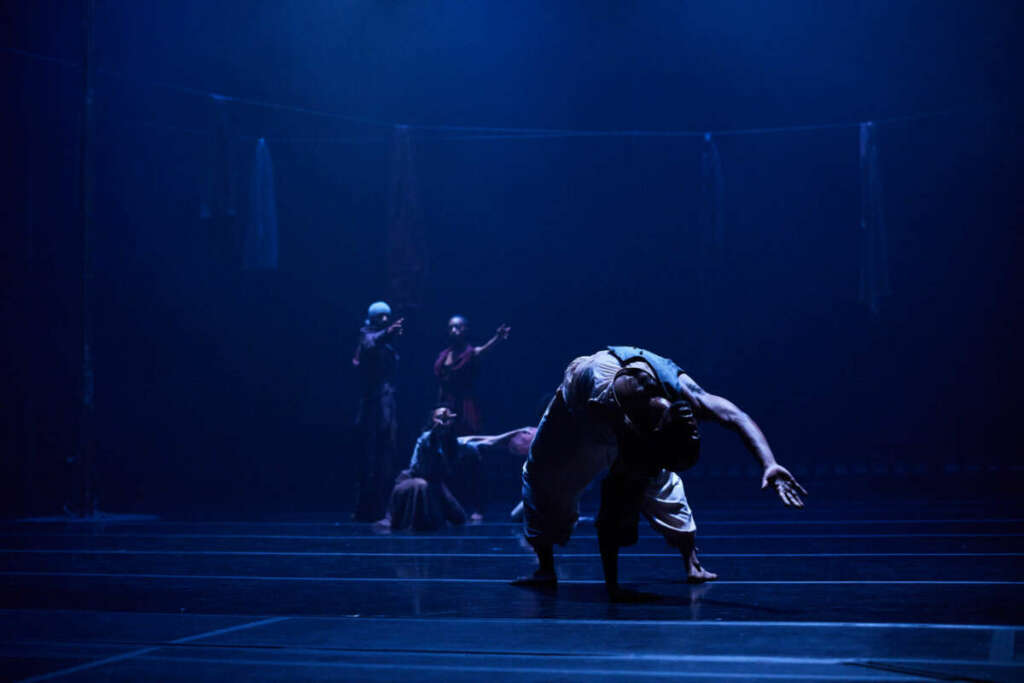
Stefanie Batten Bland’s dance theater work Embarqued: Stories of Soil makes its New York debut in 2022 at BAM. Photo Credit: Alex Boerner.
MV forever
Batten Bland and her family are, like so many Black families, annual summer visitors to Martha’s Vineyard. “We go in July, but somehow while we’re there we always seem to be celebrating Juneteenth.”
And that feels right. “Despite its contradictions, there’s no other place on earth where so many races and creeds freely intermingle as convivial neighbors and friends than Martha’s Vineyard.” And as Bland notes: “Once the island get a hold of you, it has you.” Amen to that.
Embarqued: Stories of Soil will be performed each evening at 7:30p from November 1 – 5, 2022 at the BAM Next Wave Festival at the BAM Fisher Theater, Fishman Space, New York City. Get your tickets here.
